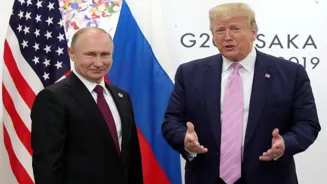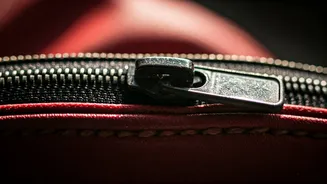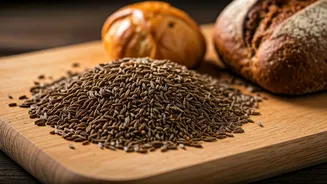What is the story about?
As Vladimir Putin has continued to defy the deadline to agree to a ceasefire in Ukraine, the Russian leader has risked a rupture with US President Donald Trump.
As Kremlin dismissed any possibility of a ceasefire in talks with Ukraine last month amid continuing Russian attacks on Ukrainian civilians, Trump reduced his 50-day ultimatum to "10 or 12 days" and raised hopes that he had finally broken ranks with Putin. The deadline will end this week.
Putin has essentially dismissed the deadline, potentially setting Russia on the path of a confrontation with the United States.
In an apparent reference to Trump's disappointment with him, Putin on Friday said that "all disappointments arise from inflated expectations". Making it clear that he had no intention to stop ground offensives, he said that "to stop our advance at any cost" was the objective of Russia's enemies and ill-wishers.
ALSO READ: With Russia’s terms to Ukraine, Putin seeks surrender — not a peace deal
Trump came to office in January as a friend of Putin who paved path of a Russian victory in Ukraine: he pressured Ukraine with the suspension of military and intelligence assistance, humiliated the country's president, ended long-running US military and intelligence programmes focussed on Russia, floated ceasefire proposals that endorsed Russian positions, diluted the trans-Atlantic security alliance, and sought a reset of US-Russia ties. But Putin kept doubling down on his maximalist demands and rejected all of Trump's proposals. He kept bombing Ukranian civilians in defiance of personal appeals by Trump.
Last month, Trump essentially concluded that Putin does not want a ceasefire and wants all of Ukraine. With the 50-day ultimatum, which his supporters cheered, he had essentially endorsed Putin's ongoing ground offensive — either out of a failure to understand its favourable implications for Putin or tacit approval of Putin's war plans. But as he reduced the deadline to 10-12 days on July 28, it was clear that his patience was running out.
However, it does not appear that Putin has taken President Trump's deadlines and threats of sanctions, tariffs, and secondary tariffs seriously so far and it appears that he still hopes that he can maintain Trump's goodwill through flattery and false promises, says Kseniya Kirillova, a Russia analyst at Washington DC-based think tank Jamestown Foundation.
With his statements, it appears that Trump has given Putin his last chance before taking punitive actions. But Trump being Trump, nothing could ever be certain.
Just around the time of the deadline's end, Trump's main negotiator, Steve Witkoff, will go to Russia on Wednesday or Thursday to hold talks with the country's leaders. The visit and signals from it should provide clarity about Trump's final position on the Russian war on Ukraine.
For now, it appears that Trump is willing to punish Russia because his friendly ties with Putin may not outpower his commitment to his base to end the war and personal embarrassment that Putin has dealt him with the consistent rejection of his peace offerings.
Despite President Trump's personal sympathies for Putin, which he has never concealed, it is important to remember that Trump is, first and foremost, a businessman, and he needs a result, which is the deal he promised to his voters, says Kirillova, the Russia analyst at Jamestown Foundation.
Kirillova tells Firstpost, "It appears that President Trump did not care what the cost of achieving the Ukraine peace deal would be. Ukraine appeared to be the weaker party and therefore it seemed logical for him to put pressure on the weaker side. I very much hope that he has begun to realise that no result will be achieved unless pressure is applied to Russia. And as he continues to see the absence of results, his sympathies for Putin appear to have turned into irritation."
ALSO READ — Ukraine and beyond: 25 years on, Putin is still fighting Cold War
There appear to be subtle signs that Putin is responding to at least some of Trump's change in tone and posture. After Dmitry Medvedev, a former Russian president who has been Putin's attack down since the full-scale invasion of Ukraine, insulted Trump on X and threatened a war, Trump announced the deployment of two nuclear submarines near Russian waters. Medvedev has been silent since Trump's announcement and the Kremlin has sobered its tone as well.
Putin may not be as strong as he appears to be and therein lies Trump's power to force the hand of the Russian leader.
The Russian economy is completely dependent on China and the war machinery is dependent on China, Iran, and North Korea. Even though the personnel situation is better than that of Ukraine, it is not sustainable.
"Putin is hesitant to declare a new wave of mobilisation or to further shift the economy onto a war footing. However, in the case of a serious offensive, he will not be able to avoid these steps. But as Russian defence plants are already operating at full capacity, there is little scope of such steps delivering desired results. President Trump therefore has certain levers of influence over Putin. Most importantly, he can provide Ukraine with more substantial military aid," says Kirillova.
If he actually finds himself cornered, Putin may actually seek a low-hanging fruit and avoid a confrontation with the West for now over Ukraine.
"For Putin, the ideal scenario is to freeze the conflict for a while, build up strength, and then resume the war — ideally with a more plausible pretext, such as accusing Ukraine of failing to comply with peace agreements," says Kirillova.
As Kremlin dismissed any possibility of a ceasefire in talks with Ukraine last month amid continuing Russian attacks on Ukrainian civilians, Trump reduced his 50-day ultimatum to "10 or 12 days" and raised hopes that he had finally broken ranks with Putin. The deadline will end this week.
Putin has essentially dismissed the deadline, potentially setting Russia on the path of a confrontation with the United States.
In an apparent reference to Trump's disappointment with him, Putin on Friday said that "all disappointments arise from inflated expectations". Making it clear that he had no intention to stop ground offensives, he said that "to stop our advance at any cost" was the objective of Russia's enemies and ill-wishers.
ALSO READ: With Russia’s terms to Ukraine, Putin seeks surrender — not a peace deal
Trump came to office in January as a friend of Putin who paved path of a Russian victory in Ukraine: he pressured Ukraine with the suspension of military and intelligence assistance, humiliated the country's president, ended long-running US military and intelligence programmes focussed on Russia, floated ceasefire proposals that endorsed Russian positions, diluted the trans-Atlantic security alliance, and sought a reset of US-Russia ties. But Putin kept doubling down on his maximalist demands and rejected all of Trump's proposals. He kept bombing Ukranian civilians in defiance of personal appeals by Trump.
Last month, Trump essentially concluded that Putin does not want a ceasefire and wants all of Ukraine. With the 50-day ultimatum, which his supporters cheered, he had essentially endorsed Putin's ongoing ground offensive — either out of a failure to understand its favourable implications for Putin or tacit approval of Putin's war plans. But as he reduced the deadline to 10-12 days on July 28, it was clear that his patience was running out.
However, it does not appear that Putin has taken President Trump's deadlines and threats of sanctions, tariffs, and secondary tariffs seriously so far and it appears that he still hopes that he can maintain Trump's goodwill through flattery and false promises, says Kseniya Kirillova, a Russia analyst at Washington DC-based think tank Jamestown Foundation.
Has Trump given Putin the last chance?
With his statements, it appears that Trump has given Putin his last chance before taking punitive actions. But Trump being Trump, nothing could ever be certain.
Just around the time of the deadline's end, Trump's main negotiator, Steve Witkoff, will go to Russia on Wednesday or Thursday to hold talks with the country's leaders. The visit and signals from it should provide clarity about Trump's final position on the Russian war on Ukraine.
For now, it appears that Trump is willing to punish Russia because his friendly ties with Putin may not outpower his commitment to his base to end the war and personal embarrassment that Putin has dealt him with the consistent rejection of his peace offerings.
Despite President Trump's personal sympathies for Putin, which he has never concealed, it is important to remember that Trump is, first and foremost, a businessman, and he needs a result, which is the deal he promised to his voters, says Kirillova, the Russia analyst at Jamestown Foundation.
Kirillova tells Firstpost, "It appears that President Trump did not care what the cost of achieving the Ukraine peace deal would be. Ukraine appeared to be the weaker party and therefore it seemed logical for him to put pressure on the weaker side. I very much hope that he has begun to realise that no result will be achieved unless pressure is applied to Russia. And as he continues to see the absence of results, his sympathies for Putin appear to have turned into irritation."
ALSO READ — Ukraine and beyond: 25 years on, Putin is still fighting Cold War
There appear to be subtle signs that Putin is responding to at least some of Trump's change in tone and posture. After Dmitry Medvedev, a former Russian president who has been Putin's attack down since the full-scale invasion of Ukraine, insulted Trump on X and threatened a war, Trump announced the deployment of two nuclear submarines near Russian waters. Medvedev has been silent since Trump's announcement and the Kremlin has sobered its tone as well.
Putin may not be as strong as he appears to be and therein lies Trump's power to force the hand of the Russian leader.
The Russian economy is completely dependent on China and the war machinery is dependent on China, Iran, and North Korea. Even though the personnel situation is better than that of Ukraine, it is not sustainable.
"Putin is hesitant to declare a new wave of mobilisation or to further shift the economy onto a war footing. However, in the case of a serious offensive, he will not be able to avoid these steps. But as Russian defence plants are already operating at full capacity, there is little scope of such steps delivering desired results. President Trump therefore has certain levers of influence over Putin. Most importantly, he can provide Ukraine with more substantial military aid," says Kirillova.
If he actually finds himself cornered, Putin may actually seek a low-hanging fruit and avoid a confrontation with the West for now over Ukraine.
"For Putin, the ideal scenario is to freeze the conflict for a while, build up strength, and then resume the war — ideally with a more plausible pretext, such as accusing Ukraine of failing to comply with peace agreements," says Kirillova.


















